The announcement that NBC / MSNBC hired former RNC Chair Ronna McDaniel as a contributor prompted an “open revolt” by MSNBC “stars,” who went directly to their TV and social media audiences to denounce the hiring because (among other things) McDaniel supported Trump’s lie that the election was stolen.
In response to the revolt, the network executives changed course and fired McDaniel. One of my readers said this:
It was good to see that at least some of MSNBC’s on-air talent still has enough journalistic integrity to risk their careers over this and put their foot down.
MSNBC’S executives? Not so much.
Indeed, the standard response on left-leaning social media is that the MSNBC hosts acted with integrity, thereby earning approval and support from their audiences.
Because I spent much time over the past 5 years tamping down misinformation and conspiracy theories originating from MSNBC legal experts and contributors, I had to take some time to think about the “journalistic integrity” part. In fact (ironically) as the story about McDaniel was unfolding, I was watching in dismay as yet another left-wing conspiracy theory emanated from the MSNBC legal pundits.
I therefore spent some time thinking about the McDaniel hiring debacle and came up with a different take. While I agree that the NBC and MSNBC executives made a mistake, I locate the mistake in a different place.
Stick with me here. It will a few pages for me to make my case because I need to bring in some scholarly work on the nature of cable news shows.
Recall from Part II of the Information-Outrage Cycle that the MSNBC (and CNN) Business Model is to hire Partisan Pundits who Offer Emotionally Evocative Performances
Dannagal Goldwaithe Young, a professor of communication and political science, describes the partisan pundit:
The phenomenon of the “partisan pundit” is a useful television (especially cable) news routine that embraces the conflict frame while offering emotionally evocative performances of partisan identity.
Pundits are talking heads who appear on the news not to “report” news but to talk about the news.
Cable news programs frequently assemble panels of pundits (for example, journalists, experts, and partisan commentators) who argue about the topic, tie that topic to broad themes in the culture war, and typically do so with the “in your face” interpersonal conflict style that increases viewer engagement while also increasing viewers’ hostility toward the other side.
Essentially what happens on cable news s hows is that experts with differing views argue it out. Young suggests that the panels succeed when they “erupt.”
Given this, it was not unreasonable (although mistaken for reasons I’ll explain) for NBC and MSNBC executives to think that having McDaniel on the panels would help with those eruptions and thereby increase viewer engagement.
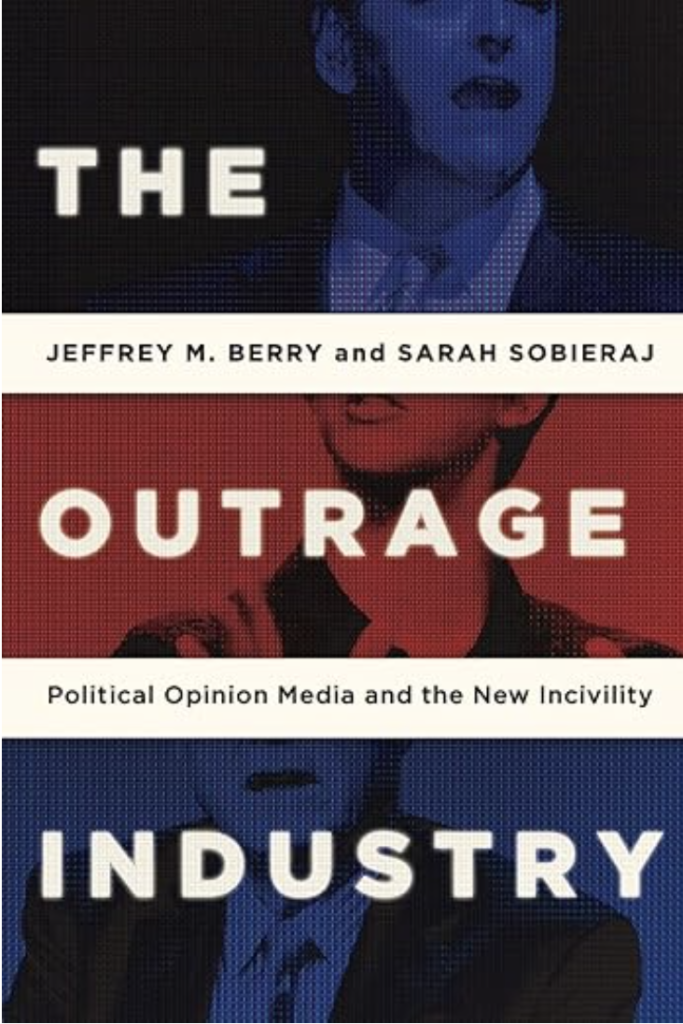
According to political scientist Jeffrey Berry and sociologist Sarah Sobieraj, the outrage industry, which includes talk radio, cable news shows, and political blogs, is a for-profit genre that is loosely based on fact but is mostly spin, hype, opinions, panic-inducing speculation, and constructed narratives.
Outrage discourse, as a rule, ignores complexity and nuance. It is not about conveying accurate information or stimulating meaningful discourse. In the words of the authors:
“Outrage sidesteps the messy nuances of complex political issues in favor of melodrama, misrepresentative exaggeration, mockery, and hyperbolic forecasts of impending doom. Outrage talk is not rational discourse. . . instead, it takes the form of a verbal competition, political theater with a scorecard.” (p. 6 – 7)
This is harsh, so I’ll offer some examples from this past week to illustrate.
The authors dispel the popular notion that the Outrage Industry is a result of our polarization. On the contrary, it has exacerbated polarization.
Young describes the characteristics of TV pundits:
Intellectual humility is the extent to which people are open to the possibility that they might be wrong. Partisan pundit panels are characterized by performances of intellectual arrogance or “I am not listening because I just want to show I’m right.” Intellectual arrogance plays well on television, whereas intellectual humility does not. In fact, we rarely see intellectual humility modeled in our mediated political world. When we do, it’s from the occasional appearance of scientists—people trained to never prove things or remove themselves from doubt. They don’t speak in absolutes or forevers. They speak with caveats and conditions and often answer with “Time will tell” and “for now this seems to be the case.”
Partisan pundits offer emotionally laden hot takes to whatever news is breaking. The problems are obvious: The moment we learn of an important event, we don’t yet have all the information. After a disaster like the collapse of a bridge, it can take days for authorities to uncover all the facts. If partisan pundits offer quick responses without nuance and then refuse to admit their first take may have been wrong, we have fertile grounds for the spread of bad information.
Important Note: Not all legal pundits on MSNBC and CNN news shows offer hotheaded and wrong opinions. There are also smart and reasonable takes. If all the legal experts were hotheads, the programs would have no credibility. Too often, though, the emotionally evocative responses are most memorable partly because they are evocative and partly because they come first: The smart reasonable can take more time and first impressions are hard to dispel.
The partisan pundit model causes people to be less informed and angrier: The way cable news talk shows present “news,” the facts get lost in an avalanche of opinions, speculation, and conjecture. Because opinions, speculation, and conjecture are often calibrated to create a strong emotional reaction in the viewer, viewers can be left both outraged and confused about the facts.
Here is an example from this past week. On March 25, we learned that an appellate court reduced Trump’s bond from $450 million to $175 million.
This was the response from MSNBC legal expert Tristan Snell: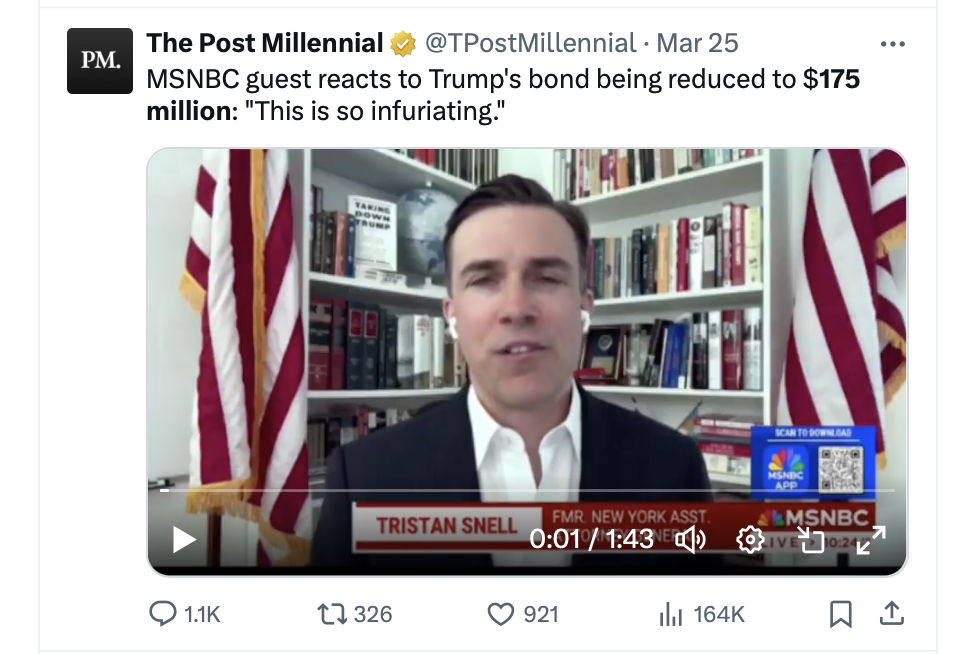
This is from Glenn Kirschner, who regularly appears on MSNBC:
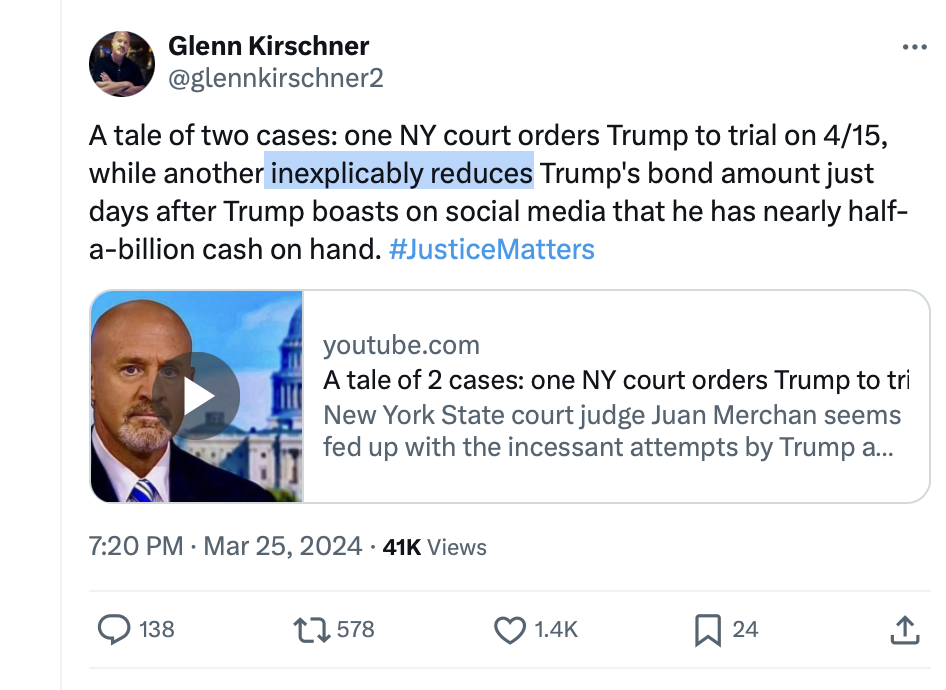
(He seems, from this, to be implying that there is a nefarious connection between Trump’s boast on social media and the court reducing the bond.)
Yes, I know that a number of well-known pundits explained that what the court did was not uncommon, and that it wasn’t necessarily bad for the attorney general. But as Facebook whistleblower Francis Haugen explained, “angry, polarizing, divisive content” gets more engagement. I suggest that it is also more likely what viewers will remember.
The reach of MSNBC contributors goes beyond the approximately 1.22 million people who tune in to MSNBC daily. The contributors also spend time building and cultivating an audience on social media platforms as well. Glenn Kirschner has almost 750K followers on Twitter and more than 600K subscribers on YouTube. Tristan Snell has almost 500K followers on Twitter.
This is an example of what circulated on social media the day Kirschner and Snell were giving their hot takes:
Jon B. Wolfsthal is not a lawyer. His post is filled with inaccuracies, misrepresentations, and flawed logic, but it got a lot of engagement. His post has 27K “likes.” His Twitter account has a “subscribe” button, which means that for $3 per month, you can subscribe to his account. I am not sure what you get for $3, but if he can attract enough subscribers, he can make decent money. 5,000 subscribers = $15,000 per month for tweeting.
The MSNBC and CNN Business Model Thus Creates Fertile Ground for Misinformation and Conspiracy Theories
Here is Prof. Young’s definition of a conspiracy theory:
Conspiracy theories attempt to explain the ultimate causes of significant social and political events and circumstances with claims of secret plots by two or more powerful actors. They assume that powerful people operating in the shadows are bad actors deliberately keeping the public in the dark. (p. 42.)
Here is the pattern she describes:
- People face a situation that is confusing or seems incomprehensible.
- They look for a way to assign blame.
- They grasp onto an easy-to-understand theory that assigns blame.
- The theory will be reinforced if people in their community and people they identify with (or look to as an authority) also hold the theory.
- Holding a conspiracy theory gives them a renewed sense of energy. Instead of feeling out of control, they have an explanation.
- Fueled by anger, they become defiant—but they have a direction. They feel they have agency. They can get behind a banner. They feel back in control.
A recent example of a right-wing conspiracy theory
When the Francis Scott Key Bridge collapsed, right-wing commentators immediately blamed minorities and immigrants, like this:
Anthony Sabatini is a Republican candidate for office. “DEI” stands for “Diversity, Equity, and Inclusion.” For Republicans, it is shorthand for, “If you hire minorities you are hiring people unqualified and there will be disasters.”
This obviously fits the definition of a conspiracy theory: A shocking event seemed incomprehensible. Bartiromo and Sabatini responded by looking for a way to assign blame.
Notice that a conspiracy theory doesn’t have to be unhinged. It doesn’t have to involve presidents returning from the dead or microchips planted in vaccines. It simply needs to assign blame for a confusing situation.
A Recent Example of a Left-Wing Conspiracy Theory
I’ll start with the facts that led to a situation that threw partisan pundits into a spin.
On April 4, 2023, Manhattan Attorney General Bragg announced a 34-count felony indictment against Trump for crimes related to paying hush money before the 2016 election.
Trump’s trial was scheduled to begin March 25, 2024.
On March 8: Trump, through his lawyers, filed a motion alleging that he received a last-minute discovery dump. Specifically, he said this:
The Prosecution has engaged in widespread misconduct as part of a desperate effort to improve its position at the potential trial on the false and unsupported charges in the Indictment. These improper and unethical actions violated the automatic discovery provisions of CPL § 245.20. Recently, this misconduct has included:
- Attempts to suppress voluminous exculpatory evidence relating to Michael Cohen at the U.S. Attorney’s Office for the Southern District of New York (the “USAO-SDNY”), which the USAO-SDNY just started to produce on March 4, 2024;
- An untimely document production on March 4, 2024;
Basically Trump claimed that 10,000 new documents were dumped on him at the last minute as part of a “strategy to hide the truth.”
On March 14: Bragg confirmed that his office had received the documents from the Southern District of New York. Bragg agreed to a 30 day extension to evaluate the documents and get to the bottom of Trump’s claims.
Also on March 14: The Court agreed to a 30-day delay to assess what had happened. The court ordered a hearing on March 25.
To emphasize: As of March 14, nobody knew what was in those documents or why they were transmitted at the last minute.
Factual reporting would look like this:
The court agreed to a 30-day delay in the trial to assess Trump’s claims. We should have answers on March 25.
Cable news shows have hours to fill. Facts will not fill those hours, so the legal experts and contributors appeared on screen and responded by looking for a way to assign blame, like this:
Andrew Weissman appeared on MSNBC. (You can see the clip here.) The host asks Weissmann “What is going on?” Of course, he doesn’t know. But he speaks firmly and decisively when he says, “At the very least this is a massive screw-up on the part of the Southern District of New York Prosecutors.” He accuses the SDNY prosecutors of “poor judgment.”
Law professor Melissa Murray blamed Merrick Garland for the screw-up:
Laurence Tribe tells us that this is “Strike Two for the SDNY” and then adds that “it is as though AG Garland doesn’t give a shit.”
Norm Eisen went on CNN and said this wasn’t Bragg’s fault, it was the fault of the SDNY:
Laurence Tribe agrees with Norm Eisen: It was not Bragg’s fault. It was the SDNY. Then Tribe reminds us that Garland is head of the DOJ (He also calls him a name: “Mr. Speedy.”)
See how they are all assigning blame for a confusing situation?
The March 25 Hearing
On March 25, after both the Court and Bragg’s office had a chance to assess the alleged discovery document dump, Judge Merchan found that Trump and his lawyers misrepresented the facts and that there were no errors on the part of prosecutors. There was no error on the part of Bragg or the SDNY.
In other words, there was no screw-up. The judge, who was visibly angry at Trump’s team said:
The MSNBC prosecutors attacking the SDNY and Merrick Garland before they had all the facts also fits the definition of a conspiracy theory. Something happened (a document dump and a 30-day delay) so Find Someone To Blame.
As is customary, nobody goes back to say, “I guess we were wrong.” Viewers don’t seem to mind. I assume this is because the next time they tune in, they find something new to be outraged about and they entirely forget the last outrage.
As a result, the commentators learn that it doesn’t matter what they say. They can talk off the tops of their heads and make stuff up and as long as they offer an evocative performance of partisan identity, they will continue to be hailed as legal experts.
Story: I have a friend who frequently appeared on a local news show as a legal expert. One day he was about to appear and had no ideas, so he called me for some suggestions on what he could say. I helped him come up with ideas, and then I said, “I could never do that.” He then assured me that it doesn’t matter what he says, he just has to say something.
One person on Twitter was furious at me for daring to accuse Laurence Tribe of advancing conspiracy theories:
The friend who often appeared on local TV also argued once before the Supreme Court. Lots of lawyers appear before the Supreme Court. It’s cool and brag-worthy, but does not transform the person into an expert on all things at all times. One problem with the current media disruption is that users of social media and viewers of cable news have not learned how to evaluate sources in this new media environment.
My take is that all misinformation is harmful, particularly when spread by major outlets.
To show the damage done by these commentators, I will show you what circulated on social media when Weissmann, Murray, Tribe, and Eisen were offering their views.
Lindy Li, a political strategist, seized the occasion to repeat all of the misleading (or just wrong) Merrick Garland talking points:
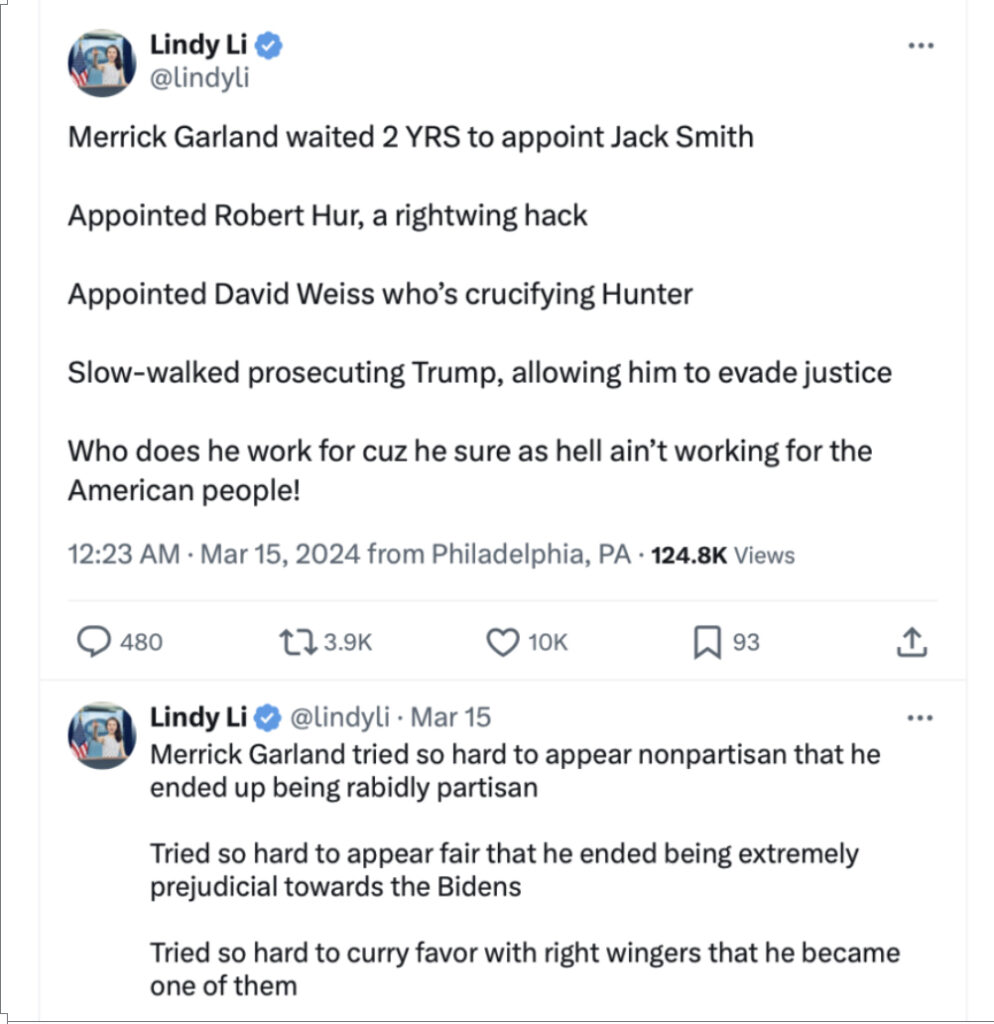 I have, in the past, fact-checked a few of Lindy Li’s statements about Merrick Garland. See this post and this post. If you read those posts, you’ll see that Garland has been vilified by this particular echo chamber since 3 months after his appointment.
I have, in the past, fact-checked a few of Lindy Li’s statements about Merrick Garland. See this post and this post. If you read those posts, you’ll see that Garland has been vilified by this particular echo chamber since 3 months after his appointment.
This person says he is a lawyer, but he doesn’t appear on TV as a legal expert, so I’ll put this one in the “social media reactions” category:
This next one proves the adage, “A lie told a thousand times becomes the truth”: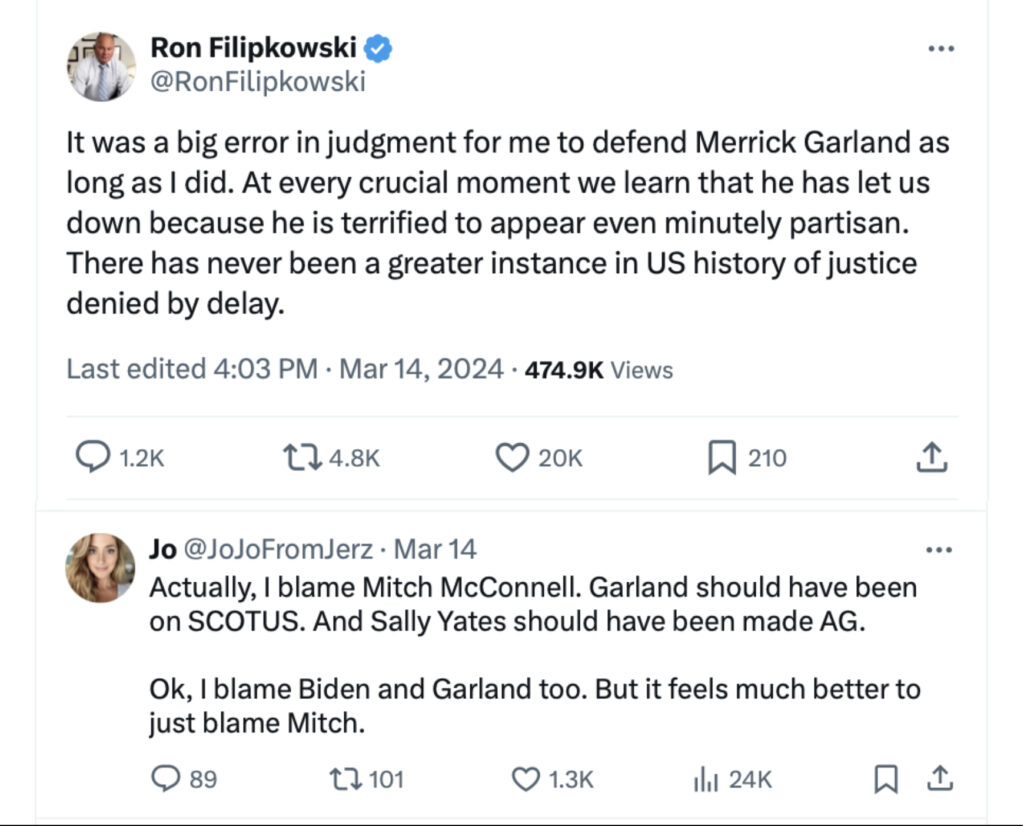
A lie told a thousand times becomes the truth because, by the 999th repetition, even the most stubborn holdouts give in to the groupthink.
Why the NBC and MSNBC Executives Hired Ronna McDaniel
This is from a Washington Post piece, which you can read free through my subscription.
MSNBC President Rashida Jones participated in recruiting McDaniel.
In a friendly call between Jones and McDaniel, the two spoke about American politics, their young children and the need to have differing views on the airwaves.
Indeed, offering “differing views on the airwaves” is what the cable news panels do.
When announcing the hire, the executive said this:
“As we gear up for the longest general election season in recent memory, she will support our leading coverage by providing an insider’s perspective on national politics and on the future of the Republican Party — which she led through some of the most turbulent and challenging moments in political history,” the memo continues. “And as a longtime Michigan resident, she’ll be an important voice from one of this year’s key battlegrounds.”
It appeared that the executives thought that the way to strengthen the news portion of the organization was to have a voice from the other side, and the way to enliven the talk show portion was to have someone with a different viewpoint.
News Reporters and Talk Show Hosts Have Different Needs
The MSNBC Hosts and Contributors are not news reporters. They are personalities. They are not out there with their microphones asking Senators questions as they hurry from one meeting to another. They are not on the ground taking photographs during an emergency. They are not running off to cover the latest Congressional hearing for their newspaper or network. They don’t break stories. They respond to stories.
Reporters need sources. They need sources who are Republicans as well as Democrats, so they work to cultivate sources. Their goal is to gather accurate news, which means being able to confirm stories with multiple sources.
How McDaniel on the staff could have helped the news reporters: If a story was breaking, McDaniel could call her friends who are still on the inside of the Trump machine, but who are disillusioned with Trump and willing to talk to someone who they trust.
From The New York Times (and other outlets): NBC political reporters remained concerned that Republican officials, who have mocked the network’s leadership for refusing to keep Ms. McDaniel, may now be reluctant to engage on stories.
Partisan Talk show hosts have different needs. Partisan talk show hosts need to grow their viewership and retain the loyalty of their viewers. On Rachel Maddow’s best days, she can attract more than 3 million viewers, but 81 million people voted for Biden. The way to increase her viewership is not to appeal to Republicans, which will cause a lot of current viewers to leave. The way to increase viewership is to enlarge her appeal to Democrats.
Given How McDaniel talks about issues, and given how cable news programs operate, NBC and MSNBC executives erred in thinking that it would be a good idea to have McDaniel appear on liberal talk show panels.
On Sunday immediately after the news of her hiring was made public, McDaniel appeared on Meet the Press and was interviewed by Kristin Welker. You can see the transcript here. The full broadcast is here.
When asked about Trump’s promise to “free” the people convicted of participating in the attack if he is elected president, she said this:
When asked why she didn’t speak out earlier, she said that as the RNC chair, she could not do that. She needed to remain “neutral.” She said that sometimes you have to “take one for the team.”
(She was widely mocked for that comment, by the way. Among those who mocked her was Liz Cheney.)
After saying she had to remain neutral, she added that now that she was no longer RNC chair, she could say whatever she wished. She also said this:
And I disagree with [violence]. I agree with him on a whole host of other things. Let’s close the border. Let’s make sure we have good incomes for people. Let’s make sure we do a lot of great things. But on that point, I don’t think we should be freeing people who violently attacked Capitol Hill police officers and – and attacked the Capitol.
She also said she will vote for Trump again because she agrees with much of his politics.
Finally, she backed away from saying Trump was responsible for the attack and in fact, said that she didn’t think he wanted the attack to happen. She also added that the RNC had nothing to do with the attack.
Here is an example of how McDaniel responded to the question of whether she regretted her actions on November 17 when Trump “pushed Republicans not to certify the election”:
See the problem? She’s trying to explain. She is muddying the waters. She is rationalizing. She minced her words.
I read the transcript but I have no idea whether McDaniel was telling the truth about what happened on November 17. Was her call perfectly innocent? Was she just calling her buddies to find out if they were okay after they were threatened?
If you ask a person questions, and no matter what she says, you will think she is lying, there is no point asking her questions unless the idea is to (verbally) slice her to ribbons while the audience cheers, and that doesn’t seem like a fair reason to hire someone. On the other hand, if she was telling the truth about what happened that night and people believe her, you suddenly introduce nuance and complexity, and according to the authors of The Outrage Industry, that isn’t acceptable on cable news shows:
“Outrage sidesteps the messy nuances of complex political issues in favor of melodrama, misrepresentative exaggeration, mockery, and hyperbolic forecasts of impending doom. Outrage talk is not rational discourse. . . instead, it takes the form of a verbal competition, political theater with a scorecard.” (The Outrage Industry)
The problem is that these shows are about putting opinions side by side. It doesn’t matter if someone is wrong. What matters is the nature of their opinions.
If only facts were allowed, Pinocchio himself could appear on the show and it would not matter because he would be fact-checked in real time. The viewer would not be given multiple opposing views. They would be given the facts.
It seems to be acceptable to say things that are not true and even float conspiracy theories as long as the pundit offers an emotionally evocative performance of partisan identity.
Saying something untrue about Merrick Garland is acceptable as long as the point is that Trump committed crimes and should be prosecuted. Implying that a court is corrupt when it lowered Trump’s bond even though there was no evidence of corruption is acceptable as long as the person is also slamming Trump.
The On-Line Revolt of MSNBC Stars was a Power Move
In traditional news environments, the editors and executives make the decisions, and reporters do what they are told. This is because reporters are sort of fungible. Lots of people want the job. Rachel Maddow is not fungible. “Without Rachel Maddow, there would be no Rachel Maddow Show.” (Quotation from The Outrage Industry.) In other words, the MSNBC stars have some weight to throw around.
When, en masse, the stars went on the air and made their case to their viewers about why McDaniel should be fired, they were not risking their careers. If all of them walk, MSNBC will crash.
I found a clip of what Rachel Maddow told her viewers here. I’ll offer the following summary:
Maddow opens with an emotional and moving tirade against Trump and how he attacks the free press and the integrity of elections and is trying to install himself as a strong man (but we are catching on to him.) She said, “He would have been forgotten if he hadn’t been able to attach himself to the Republican Party.”
She then accuses McDaniel of helping him do all of these things,
She then slammed the MSNBC leadership for not objecting to the hiring of McDaniel when the matter first arose. But, she praises the executive leadership for responding when the hosts and staff objected by promising that McDaniel would not appear on MSNBC.
Maddow was clear about this: Over the weekend, the MSNBC hosts were promised that McDaniel would not appear on any MSNBC shows (presumably unless one of the hosts chose to invite her.)
But Maddow did not stop there. She then said that the fact McDaniel is nonetheless on the payroll at NBC News is “inexplicable . . . and I hope they will reverse their decision.” She said, “You wouldn’t hire a mobster to work at a DA’s office. You wouldn’t hire a pickpocket to work as a TSA screener.”
In other words, she put pressure on the executives to reverse their decision and fire McDaniel. It wasn’t enough that she would not appear on MSNBC shows.
She also added, “This is a difficult time for us as a country” and “We have never dealt with anything like this before.”
My personal take: Maddow delivered an emotionally evocative performance of partisan identity. However, I recoiled from it, particularly when she said, “We have never dealt with anything like this before.” A Black American woman living in 1860 may see things differently. Perhaps it’s the defense lawyer in me (I dedicated my career to representing people who were among the most vilified members of our society) but I think it’s a little unfair to pin everything Trump ever did on the chair of the Republican Committee. The entire speech was an example of appealing to emotion over reason. I could assign it to a college class and ask them to find the transparent and manipulative rhetorical devices.
I will also confess that it was the first time I ever listened to Rachel Madow speak.
(I have, however, watched a few Glenn Kirschner clips because I was fact-checking and wanted to confirm that he had indeed said what people said that he said. What struck me was the emotion in his delivery. He paused dramatically to say “Because. Justice. Matters.” After watching Rachel Maddow I understood what he was doing, but his performance was a poor imitation.)
I read some of the comments to Maddow’s speech on Twitter and saw how Maddow’s fans reacted. They were moved and sang her praises. She was the best! They adored her! The attack on Ronna McDaniel and pressure on the executives to fire her caused Maddow’s stock to go up with her viewers, which means her stock went up in general.
She and the other hosts won. McDaniel was fired.
I suggest that the firing of McDaniel will exacerbate partisan animosity and polarization. Firing a Republican after she made a plea for people to get out of the echo chamber and listen to each other seems problematic to me. (Not that any MSNBC viewers would have listened to her, but her plea may resonate with people who are not MSNBC viewers.) She was hired. She gave the interview. She was fired. It was, however, a win for the hosts, who earned the praise and loyalty of their viewers.
From The Outrage Industry: The outrage is not the result of polarization. It exacerbates polarization. The errors made by the executives will, unfortunately, exacerbate polarization.
I suspect that the executives now understand the power wielded by the stars and they will not make an important move without first consulting them. I will leave others to consider whether opinion shapers should call the shots for a news network (Remember I am distinguishing talk shows from news.)
McDaniel was right when she said liberal audiences would not respond well to her. The executives were wrong. There may have been a place for McDaniel at NBC News, but she should not have been sprung on the MSNBC hosts the way that she was.
At the same time, I am not sympathetic to programming that, as part of its model, tolerates conspiracy theories and rejects nuance as long as the conspiracy theories are the right kind of conspiracy theories.
Yellow Journalism: Another Historical Model for Today’s Media Environment
This is from the U.S. State Department Office of the Historian:
“Yellow journalism was a style of newspaper reporting in the late 19th century that emphasized sensationalism over facts.” Yellow Journalists used a “sensationalist style,” and “bold headlines and creative drawings of events” and as a result, “sold a lot of papers for both publishers.”
“The peak of yellow journalism, in terms of both intensity and influence, came in early 1898, when a U.S. battleship, the Maine, sunk in Havana harbor. The naval vessel had been sent there in a display of U.S. power. On the night of February 15, an explosion tore through the ship’s hull, and the Maine went down. Sober observers and an initial report by the colonial government of Cuba concluded that the explosion had occurred on board, but Hearst and Pulitzer, who had for several years been selling papers by fanning anti-Spanish public opinion in the United States, published rumors of plots to sink the ship.”
In other words, the publications reacted to a major political event by making stuff up and casting blame.
Yellow journalism arose in a profit-driven environment when publications were competing for readers and learned that sensational rage-inducing material sold more newspapers. The owner of one of the newspapers, Hearst, allegedly said, “You furnish the pictures. I’ll furnish the war.”
In a recent newsletter, Heather Cox Richardson explained how the United States evolved past the era of yellow journalism:
The sensationalism of what was known as “yellow journalism” created a backlash that gave rise to new investigative journalism designed to move away from partisanship and explain clearly to readers what was happening in American politics and economics. In 1893, McClure’s Magazine appeared, offering in-depth examinations of the workings of corporations and city governments and launching a new era of reform.
History doesn’t repeat, it rhymes. In our current media disruption, as in the late nineteenth century, sensationalism is emphasized over facts.
I don’t expect to get out of the current era of yellow journalism through the rise of new publications. The problem right now is that there are too many publications and too many outlets competing for clicks and viewers.
I believe we will get out of the current era of yellow journalism by educating the public, particularly the young people. College instructors and teachers are helping students understand what is happening with the current media disruption and how to navigate the firehouse of bad information.
The young people will have a lot of messes to fix, and the current media disruption is one of them.
ADDING: I have turned off the comments to this blog post
I will discuss the comments next week.
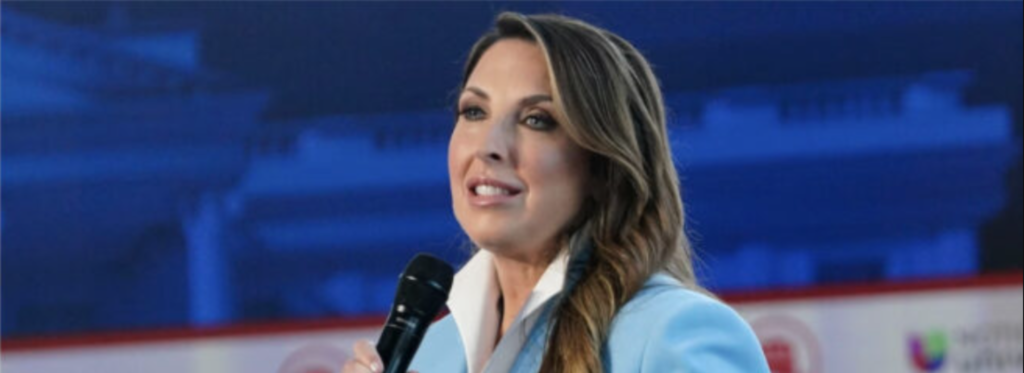
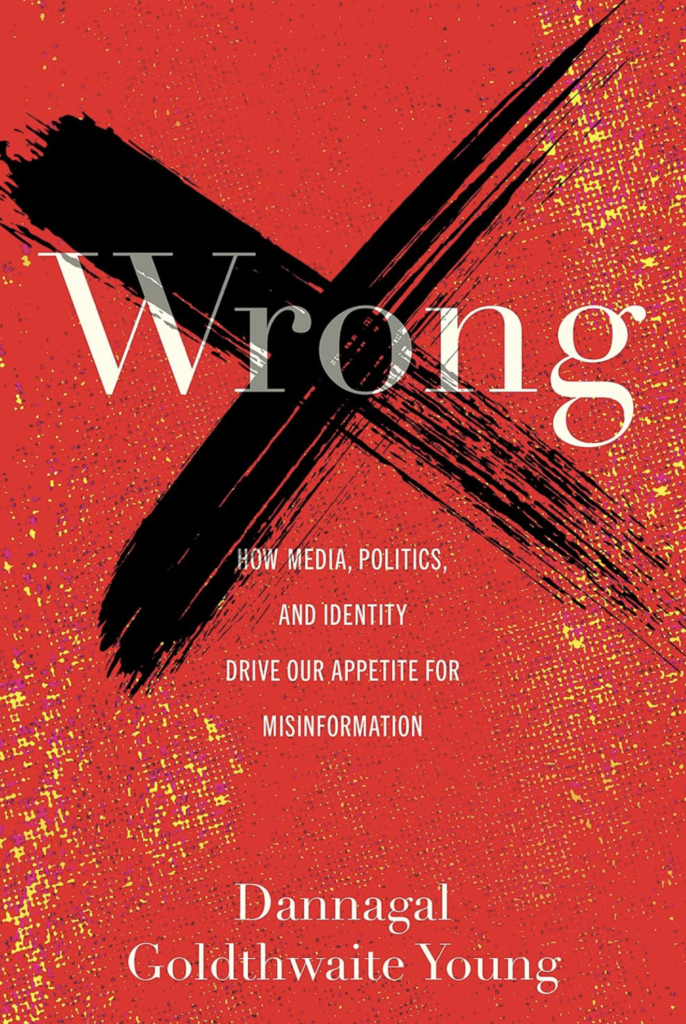
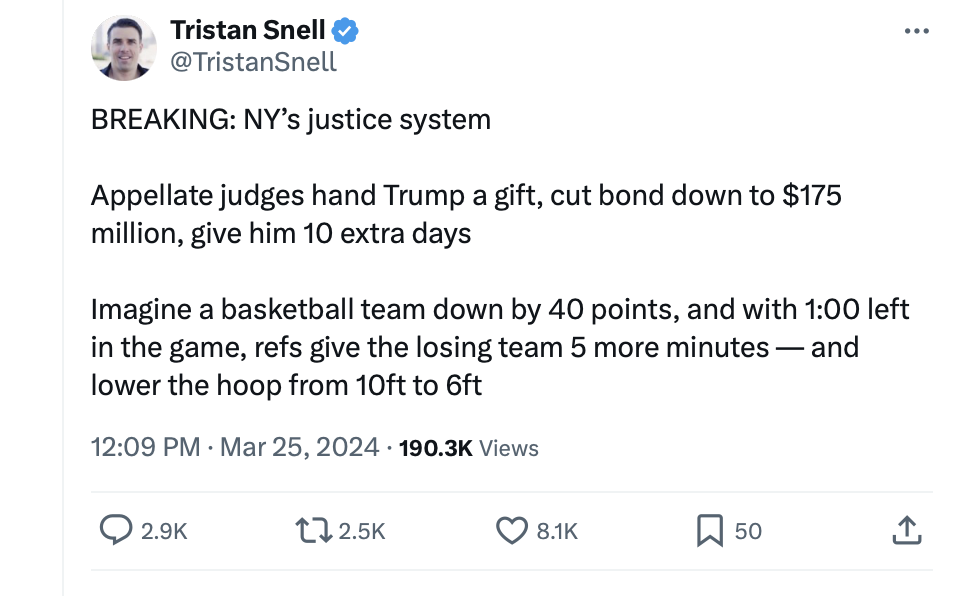
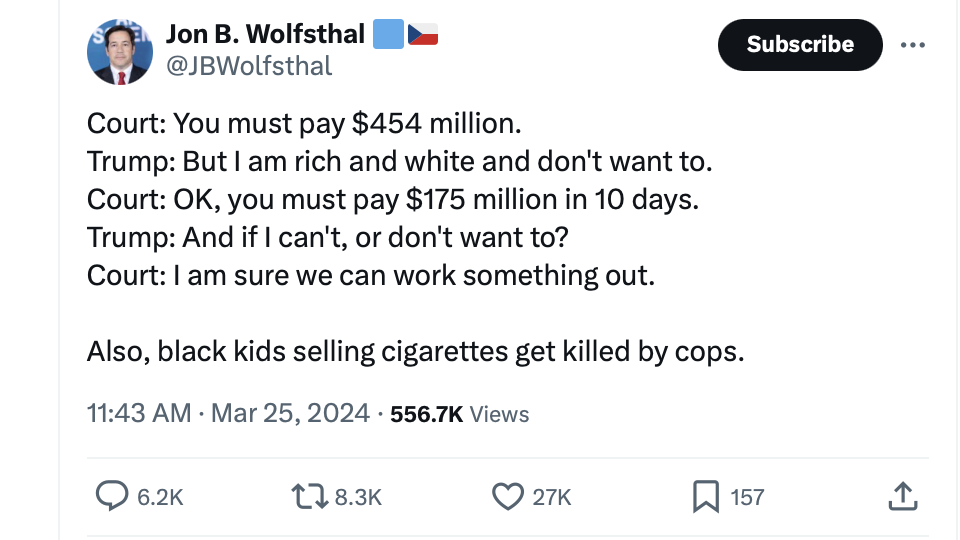
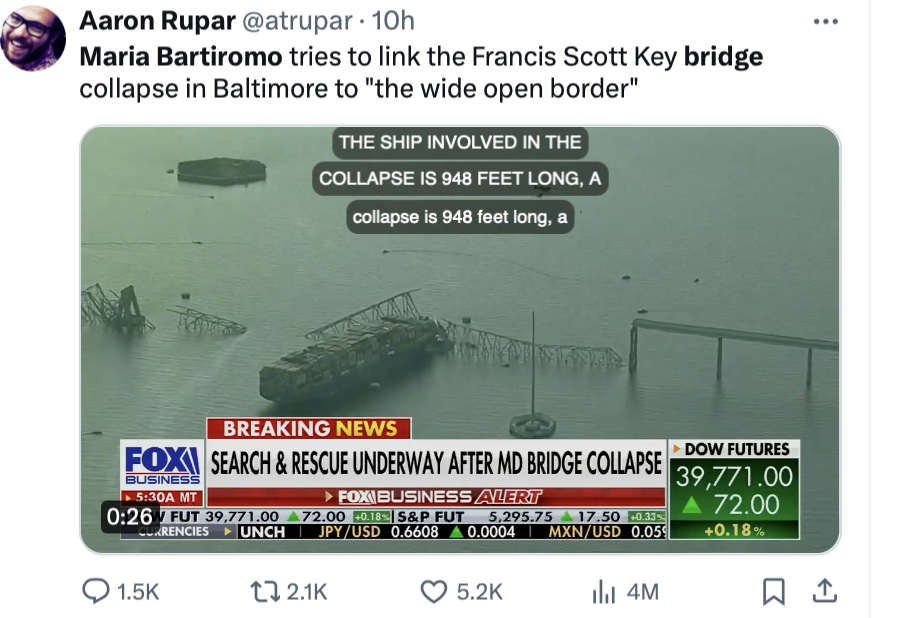
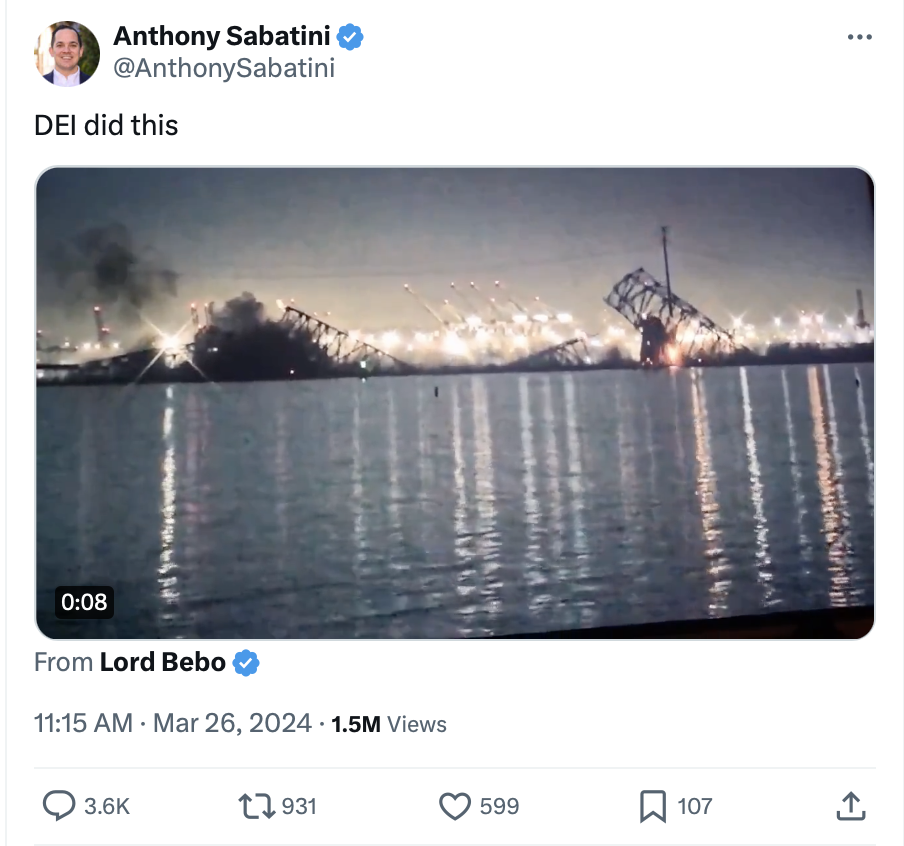
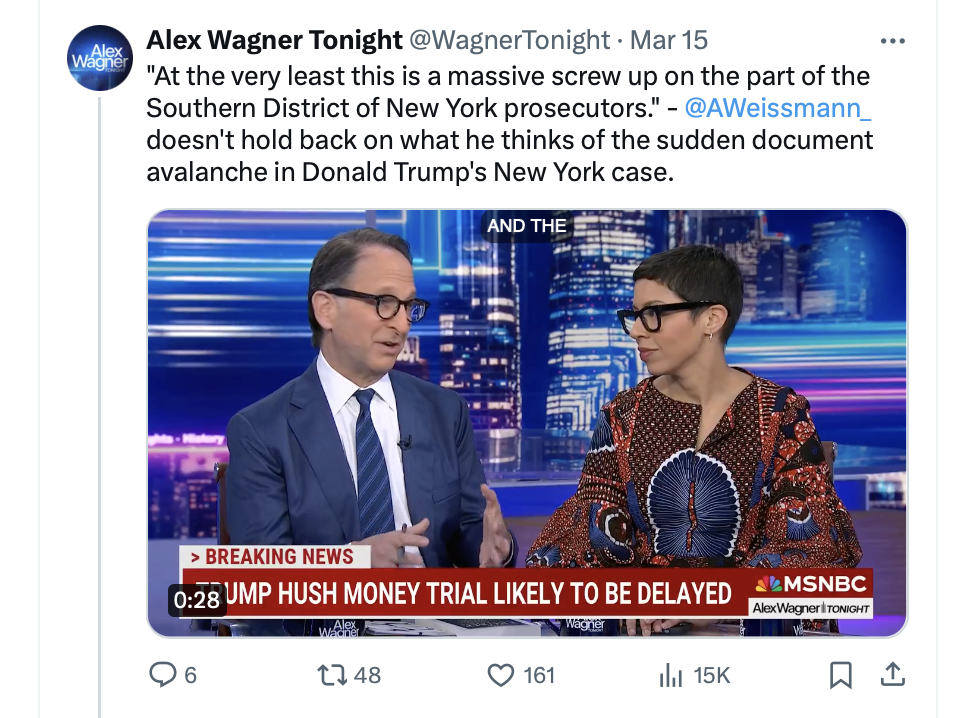 .
.
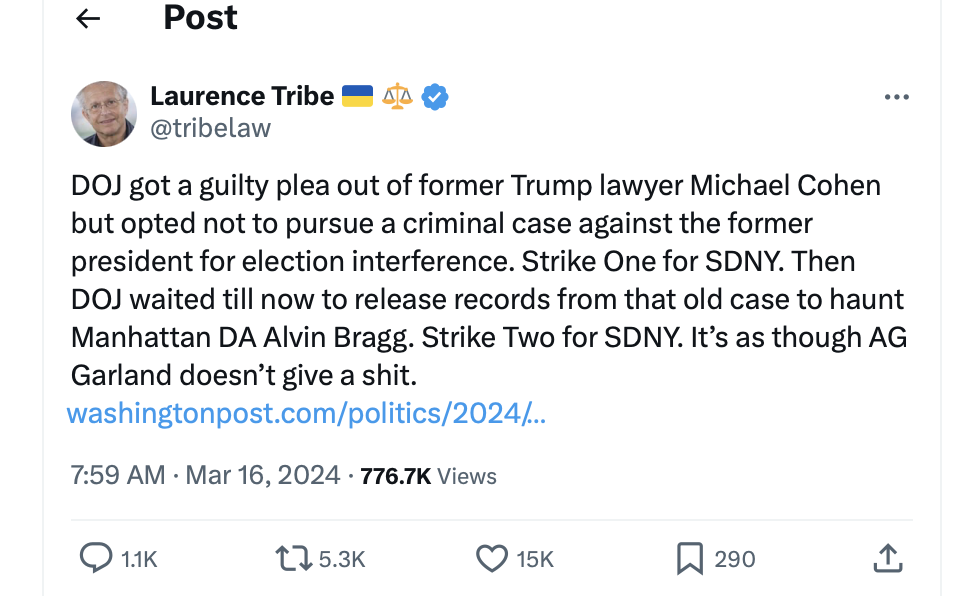
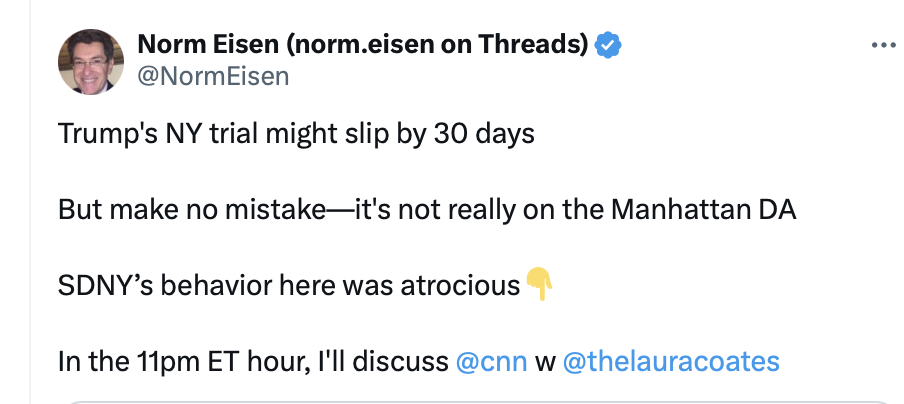
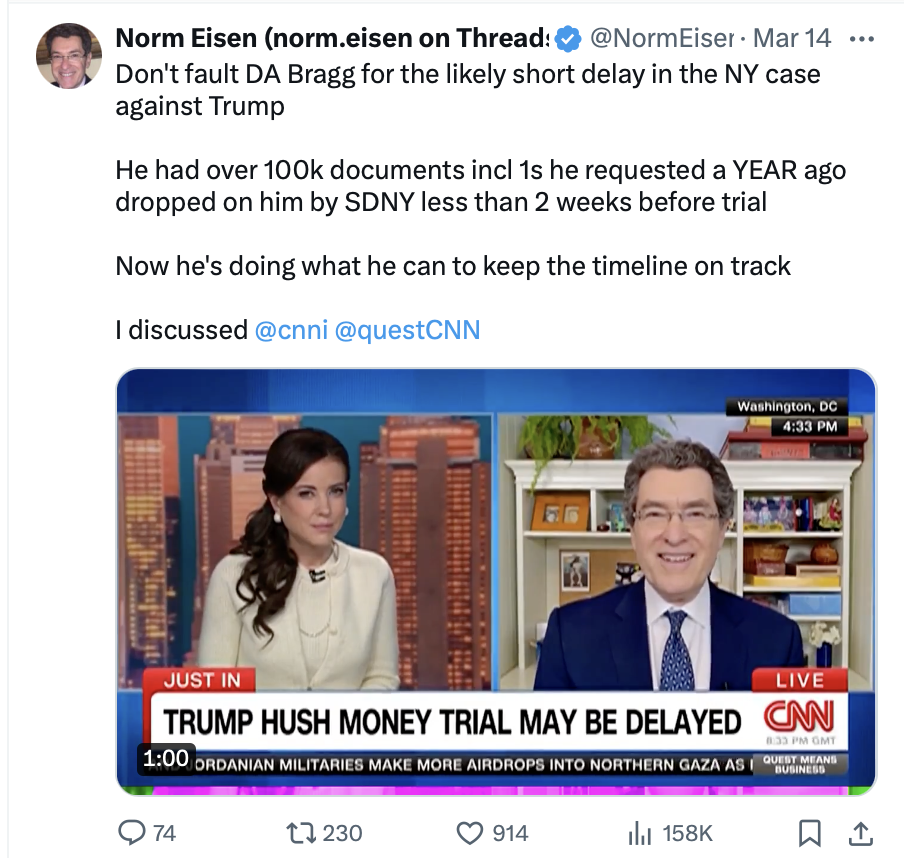
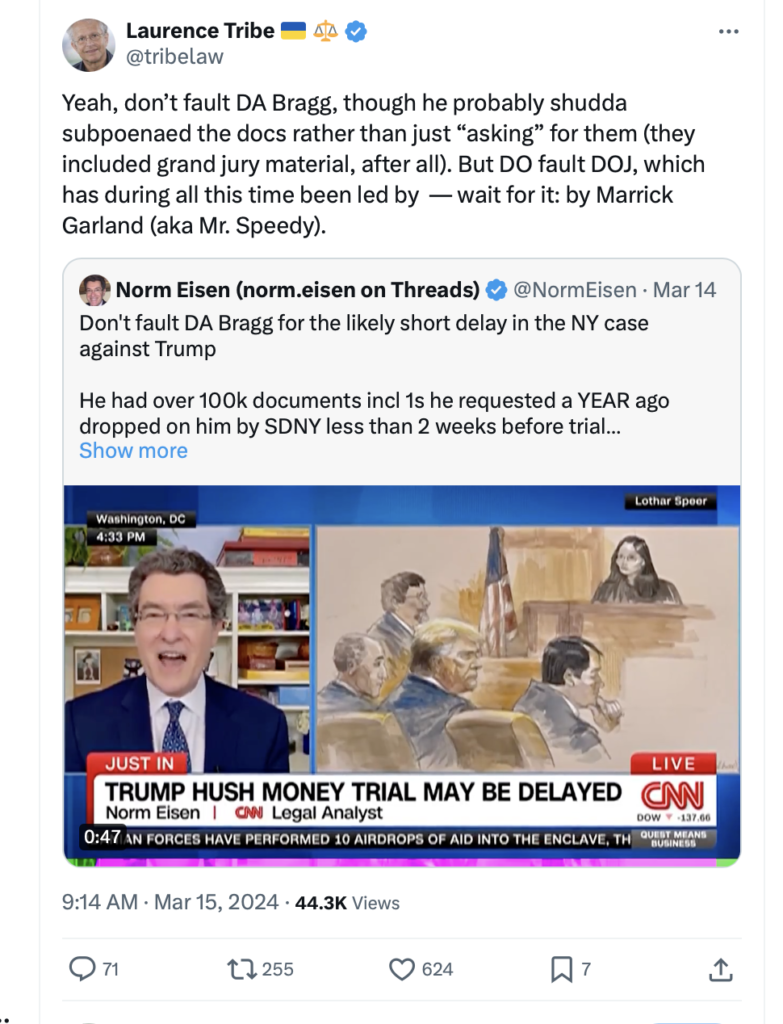

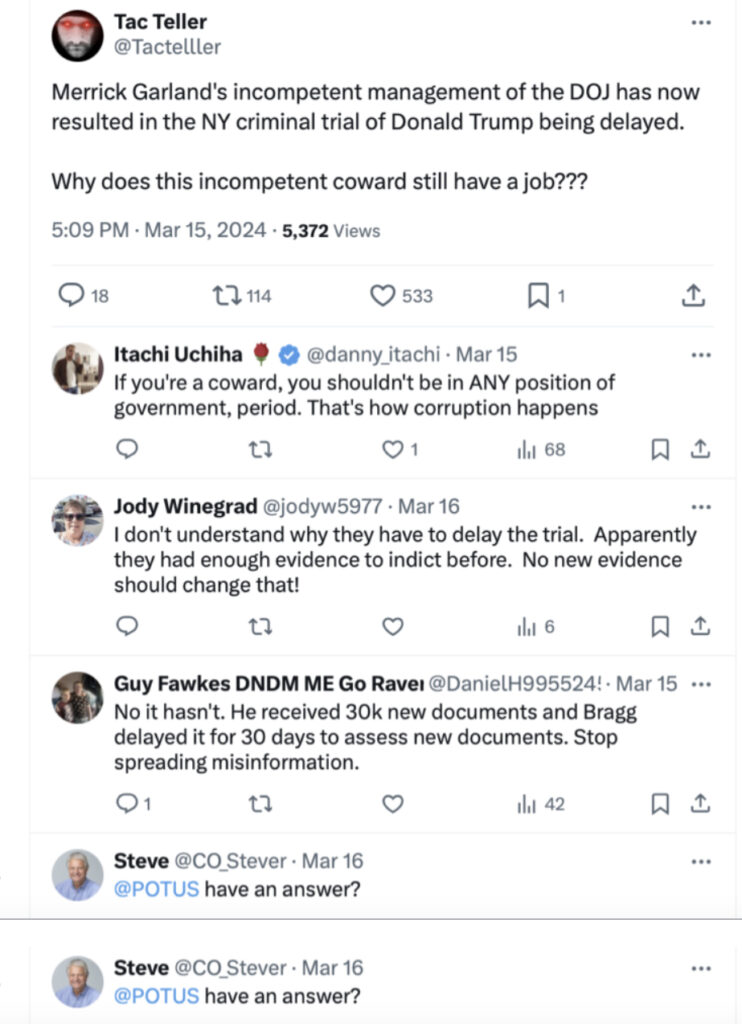
I am delighted by the nuance and perspective in this post. I agree, there may have been a place for McDaniel somewhere in the NBC News organization, but probably not as an on-air host or panel member. And it would require a different approach to presenting news.
I think there is a place in cable news for analysis and commentary, as a way of assisting the public in putting current events into historical and cultural perspective, and combatting the snap judgement and conspiracy theories. It likely is harder to give good nonpartisan (nuanced) analysis than it is even to present news neutrally as simply the facts as known and verified at the moment. (You do a great job with even-handed analysis and commentary, by the way.)
I miss the days of the original Headline News cable channel, which just simply did a half-hour news report ever half hour, and didn’t have time for the conspiracy outrage that drives cable and social media today. And I miss Edward R. Murrow and Walter Cronkite, who could put facts into perspective without ridiculous emotional partisanship. There certainly is a place for partisanship–Molly Ivins and Mike Royko are two of my favorite examples, but they never pretended to be reporters. And it is indeed important to have varying viewpoints–but when the clash of opinion is presented as a gladiator sport or a pseudo-intellectial version of processional wrestling, the meaning and usefulness are gone. At least, if the intent is to advance any comprehension, then the usefulness is gone.
Thank you for your perspective, I always enjoy reading from you and I learn a great deal each time. While i do agree that there are hot takes that seem to cause outrage, I do not agree with all you have made as examples here.
For example, you stated that Glenn Kirschner from his post seemed to be implying that there is a nefarious connection between Trump’s boast on social media and the court reducing the bond. I did not read it this way, what I see is that despite the fact that Trump boasted of having enough money to cover the bond, the courts nevertheless reduced it, with no rationale given for the decision; and that really is the truth.
Second one I do not totally agree with is Andrew Weissman’s characterisation. He did accuse the SDNY prosecutors of “poor judgment”. But I don’t think the court specifically commented on the late production of discovery by the SNDY; just that the Manhattan DA has not erred.
There was NO late production of discovery by the SDNY. It was all invented. Documents were transmitted, but they were not discovery and were not relevant to the case. Trump and his lawyers misrepresented what was inside.
I should have been clearer and I should have offered more quotations from the Court.
The SDNY did nothing wrong. The DOJ did nothing wrong. There was no blame to assign to any of the prosecutors.
The legal experts should have waited for more information, but they didn’t. As a result, they spread bad information. More specifically, they engaged in conspiracy theories, looking for a way to blame the SDNY and DOJ for a 30 day delay.
The reason I look forward to your articles is the obvious thought that goes into them. This one on Ronna is a masterpiece whether or not the reader agrees.
I rarely watch MSNBC. I far prefer the written to the spoken words. Thank you for your work!
I didn’t love this post. Mostly b/c you cherry-picked MSNBC segments with people who are not regulars – i.e., Glenn K and Tristan S. And Rachel’s segment provided the historical context (per usual) of why Ronna’s behavior was problematic. None of the MSNBC hosts are opposed to conservative voices. They are opposed to pro-insurrection voices. As they should be.
Glenn Greenwald on McDonald
https://www.youtube.com/watch?v=OqlZ9BYVZCc&t=149s
Teri –
Longtime reader/admirer.
While I agree with much of what you’ve said, I have to say that I found your example regarding the 30-day delay in Trump’s NY trial to be a bit flawed (unless I missed something).
The pundits appear to have found fault with the SDNY (federal) for the document dump, not the NY AG.
You then appear to imply that the pundits ‘got it wrong’ by pointing out that the NY AG had nothing to do with the dump/delay.
I don’t see how this is an example of the pundits ‘got it wrong’ and thereby supporting your (correct) contention that they (and we) shouldn’t get out over our skis before the facts are in.
I also did not interpret Maddow’s comment that ‘we haven’t been here before’ to allude to the fact that WE (meaning this generation) hasn’t faced anything like this before (which, I believe is accurate in the details if not thematically).
Anyway, I fully support healthy(!) discussion with both ‘sides’ represented so long as arguments are made in good faith (something I personally do not believe McDaniel can do).
I didn’t explain fully.
There was no document dump. Trump made it up. (I didn’t explain the details because the law gets complicated). The SDNY did nothing wrong. The Manhattan DA’s office did nothing wrong. The DOJ did nothing wrong.
And yet, Larry Tribe and Andrew Weissmann and others jumped to blame them for something that actually didn’t happen.
Trump made it up. (There were documents but they contained nothing relevant to the case, and the delay was because of Trump.)
What happened was this:
(1) Trump lied about a document dump.
(2) The Pundits assumed that Trump was telling the truth and blamed the DOJ and the SDNY.
Why did these otherwise smart people give credence to Trump’s lies when they know he is a liar?
The fact they had was this: “The Court will delay the hearing 30 days to assess Trump’s claims.” They then blamed the SDNY for the 30 day delay.
See?
They made up shit. And nobody cares.
I believe the problem with the so-called document dump is that we (at least I) assumed it was Trump’s LAWYERS who were being truthful about additional docs. Now, if it was TRUMP saying it on his own … well that’s a totally different story.
I really appreciate your taking the time to respond! Thank you!
So my response is likely more motivated by frustration rather than the Law, but it seems to me that the court’s response is dysfunctional in that it would appear to be rewarding Trump’s dishonesty by keeping the delay in place.
If there ‘was no dump’ and it was a lie, there would, in fact, be no need for any delay.
Frankly, it would seem to me that the court date should be moved up at the very least.
Why aren’t trumps lawyer sanctioned for making misrepresentations to the court?
Anyway, thanks for all you do Teri. I always find your perspective enlightening, even when I don’t entirely agree.
Let me try again to explain.
Trump filed a motion. The motion made serious allegations. Nobody knew that the allegations were fabricated until the court and Bragg investigated them. Investigating them took 30 days. The trial could not go on at the same time.
The delay was necessary to investigate the allegations.
The delay had nothing to do with the behavior of the DOJ, the SDNY, or Bragg. It had to do with the time needed to investigate the allegations. They were found to be false.
There. Was. No. Discovery. Dump. Trump manipulated the entire thing.
Just because a lot of documents were transmitted doesn’t mean that the person transmitting the documents did something wrong or inappropriate.
*Ugh.
I meant that “I DID interpret Maddow’s comment to allude…”
Apologies
I posted this article on ScheerPost. Named after Robert Scheer. My guess is very few of your readers no who he is. This the one comment on your article
lots of good points, but misses the bigger point that all the networks are owned and controlled by the 1% and work towards the same goals. For instance all of the major networks fully back the line that Russia’s attack on Ukraine was unprovoked, a Russian war jeopardizes the future of Europe and the and that Ukraine is a peace loving democracy. They all have supported Israel and the U.S. in the Gaza conflict, in spite of now having to tone it down a little. They never mention the effect the $ trillion a year defense budget has on our crumbling infrastructure declining school system, lack of universal healthcare, etc. The anchors are all just actors spinning the news to their own listenership and, as Chomsky has pointed out, keeping the discussions without the acceptable boundaries. No Palestinian or Iranian, or Russian, or Chinese viewpoints or spokespersons allowed.
Good point, very good point.
I know Scheer from way, way back…courtesy of the LA Times. As a minor aside, I can personally attest that his comments often have to be evaluated with a very critical eye.
I could be wrong but this blog repeatedly and consistently misses the ownership and profit issues affecting the structure of today’s ‘news’. We might discuss the global, individual reach media has today versus a century ago, where millions were huddled about their radios each evening and wedded to their toils each day, limiting the reach of the media. We might also mention–which I believe has been mentioned here–civic education, beginning at the elementary education level and continuing. It used to be there: I can still look back to ancient Report Cards of mine attesting to ‘citizenship’ and ‘civics’. The last time I saw those subjects in the curricula ? I couldn’t tell you. It’s been decades, tho’.
I find it amusing how folks look at me when they learn I have no cellphone; that I watch television–other than The 3 Stooges–no more than 2-3 hours per week; that I make my evaluations based sober assessment of facts, not the outrage I keep hearing about.
I understand it’s difficult for folks to believe my claims which is, perhaps ironically, why I find it difficult to believe these habits and abilities with regard to ‘news’ consumption will be altered: we live in differing worlds now. So long as the country monetizes the news airways in the manner it does–shades of Citizens United, I might add–I don’t see this toothpaste being shoved back into the tube.
I too have stopped regularly watching MSNBC. When an important story breaks, like the reduction in Trump’s penalty for fraud, I will tune in to try to get information, but I’m usually frustrated by the need to create a narrative about what happened, I rarely get insight into why it happened. I am extremely worried about how the election will continue to drive people into hardened positions. What can each of us do to bridge this gap and take us all off the ledge?
I have a to-do list that people find helpful: https://terikanefield.com/things-to-do/
Ms. Kanefield — I’ll start with thanks for your detailed, thoughtful, careful and generally correct analytical approach to the issues of the day — principally those either headlining or embedded in the law cases that populate our public affairs. It’s all good.
That being said, I think you are missing the boat with your views of the media establishment, principally cable news, as outlined in your analysis of the Ronna McDaniel story. For whatever reason, you seem wedded to the both sides do it, the left is just as bad as the right, they all operate on the same model structural framework for analyzing your focus on MSNBC and CNN. I’ll agree with you that our news media generally are today afflicted with a life-threatening cancer, but it’s not the eyeball attracting outrage machine you posit. It actually begins a long time ago with Roger Ailes and now centers on Donald Trump. I could go on for a long time with a lot of what I’ll call competing analysis and focus, but I don’t have the time. I’ll simply say two things. One, some of the examples you cite reflect less than the highest standards of journalistic news and comment delivery, but I think you vastly overstate the case for their being part of what is your version of a conspiracy — namely left-wing rage inducement. Two, I commend your attention to a post from another commentator on these matters as they are being addressed by the media — Rick Wilson today. Here is the link:
https://therickwilson.substack.com/p/maga-vs-media-a-love-story?utm_campaign=email-post&r=4rqfj&utm_source=substack&utm_medium=email
He’s got it about right.
Thanks for all you do and contribute.
Thank you for yet another brilliant analysis of the media environment and how these opinion shows and panels are damaging. I was not at all surprised that NBC hired her. It’s the logical outcome of the Professional Outrage Complex. I don’t watch any of the cable or broadcast outlets for “news” (except I do watch local news and scream whenever the POC opinions bleed into local “news” when they switch to network “reporter” for “coverage”.) I can be hyperbolic so I will refrain from further comment!
Another good one!
I’m grateful for your work. It delivers a different and noteworthy take of the current affairs. In the scary times we live in such voice is of utter importance.
Given the financial incentives to do otherwise, this is probably wishful thinking, but I’d like to see these hiring decisions be based on whether the person will consistently make good faith arguments rather than simply expressing opposing points of view. For every opposing point expressed, find one or more points of agreement. Until we can reach some common understanding of what the basic problem is, there’s no hope of reaching any solutions.
But the entire model of talk shows is to express opinions. Right?
I’ll leave my take, which does not match yours, here, regarding how the NYT portrayed the firing of Ronna McDaniel.
Not sure whose words these are in your latest article about NBC not retaining Ronna McDaniels, written by Michael M. Grynbaum and John Koblin: “The episode underscored the deeply partisan sphere in which news organizations are trying to operate — and the challenge of fairly representing conservative and pro-Trump viewpoints in their coverage, if major Republican Party figures like Ms. McDaniel are deemed unacceptable by viewers or colleagues.”
A point which is somehow being ignored here: at this juncture, “pro-Trump viewpoints” aren’t just unacceptable to “viewers and colleagues”, they’re literally anathema to our system of governance and unacceptable to small d democracy as we know it, but apparently not to your editorial board?! There are decidedly NOT two sides to this argument. Regarding McDaniel’s role in trying to reverse the last election, it’s not a matter of shutting off another point of view, it’s a matter of not aligning with borderline criminality in the pursuit of the overthrow of a free and fair election. There IS no way of “fairly representing” such behavior as anything else. This has nothing to do with partisanship- she should have no role in disseminating her “opinion” in any place but a courtroom under questioning, in a trial regarding Trump’s attempted coup.
To illustrate how wrong NBC was, why not bring in a jailhouse op- ed from Ghislaine Maxwell on grooming young girls? Is there some kind of upside, some kind of “point of view” missed by not letting her have a say? How can any moral- or even thoughtful- person editorialize around that? You need to better serve your readers. Trump’s bloviating and that of his co-conspirators ceased long ago to have anything to do with “viewpoints.” Some people are most likely going to prison for them, and you debase yourselves by characterizing them as anything but a threat to our system of governance.
Respectful but angry,
Frank Sprouse
Eugene, Oregon
You are a strong advocate for your positions and you do so without “both siderism” of the mainstream media. Nevertheless I respectfully disagree with your positions, as follows:
1. McDaniel’s repeated references to “problems” in Wayne County lack any “nuance.” She forsook the name of her grandfather, George Romney, a champion of civil and voting rights in the 1960s, as demanded by Trump. The only “problems” in Wayne County were that blacks voted to oust Trump. There isn’t anything new or nuanced about her position, never proven, that big city black voters vote illegally or even improperly. It is among the biggest of the big lies that she willingly promoted.
2. MSNBC is weak and often fearful of Trump. Maddox’s cringey performance epitomized the defeatism of the network. I’ve never heard MSNBC call out ridiculous NY Times or Washington Post false equivalence which are far more destructive hidden behind a false aura of alleged fairness than the lies of a hack like McDaniel. MSNBC could use less hand wringing and much more outrage.
3. I agree that there is no evidence that Garland hindered DOJ investigations of January 6. He did, however, place himself in some type of above the fray category that doesn’t serve the needs of leadership that must be shown by the Attorney General. Instead he bowed before Comer and Jordan and permitted a one of Akins targeted prosecution of Hunter Biden to go forward. He also appointed a partisan Republican to investigate the President when there was no need to do so. Continuing a long tradition that only Republicans can investigate Democrats (and Republicans too) isn’t honorable or forthright, it’s simply a personal promotion of Garland as a principled neutral when a principled neutral would have done the opposite.
Thank you! Outrage is essentially lazy, the hard, slow work of defending democracy and listening and understanding is not.
Gotta say I dont agree with calling it exactly conspiracy theory, most of those peoples are accusing them of incompetency not of doing some sort of back alley deal to “let Trump off easily”, only the Kirshner of the examples was, seemngly, implying some sort of bribery, the other were just, excuse my languge, typical “shit sturders” just saying whatever comes to mind at first or worst calculated insinuations to “stir” the proverbial shit,….
On my part what seems to work for me is the following: I get some rage inducing article/opinon etc, I have my fit, my reaction, let it takes its course out of me, and then think about the issue again, it doesnt always work specially on Twitter/X but it does help
Just finished the first half of Dannagal Goldthwaite Young’s book ‘Wrong’. Interesting read on the psychology of partisanship, helping me to better understand our political divide.
I do believe that you have to watch MSNBC and Fox, at least occasionally, to understand that they are no way near equal and opposite. On the subject of McDaniel, Chris Hayes said that everything he says on his show, he actually believes. Occasionally he gets something wrong, but he’s not saying one thing and believing something else. That’s the problem they have with McDaniel. In service to Trump and MAGA, she has a history of saying things she doesn’t believe. It’s not a matter of excluding conservatives. The other hosts, including three Republicans, seem to be honest in that regard. It’s a matter of integrity. Even the panelists are mostly telling the truth as they see it, though there’s plenty of wild speculation and partisan jaw jacking. I fast-forward through much of that.
Fox personalities, in contrast, have had their internal messages exposed in legal proceedings. In some of those communications they had very different opinions and concerns than those they presented on their shows. Lawyers for Fox were able to get a case dismissed by arguing that no reasonable viewer would take Tucker Carlson’s statements seriously.
History doesn’t repeat, it rhymes. In our current media disruption, as in the late nineteenth century, sensationalism is emphasized over facts.
Yes! So difficult to navigate.
Thank you Teri.
I respectfully agree with all of the eloquent people who disagreed with your post.
So do I. So many (irrelevant, misrepresentative) words, so little persuasiveness. Constant contrarianism is also a form of misinformation. Glenn Kirschner + Tribe were right, and nothing presented here proves otherwise. A sadly off-the-mark, disappointing piece.
I let this comment through but I shouldn’t have. I am not deleting it because there are so many responses.
I may start turning off comments on my blog.
There is no both-sidism here,
We will either save our democracy,
Or we will lose it.
Sounding the alarm does not make one partisan-just look at the list of past republicans who have denounced what it has become, & even the furthest right politicians clearly stating they will vote for President Biden.
Making MSNBC one’s outrage while trump, his minions (of whom Ronna is one) & much of the media SUPPORT HIM in his endeavors continues to take the focus off of the stark and dire realities we must successfully overcome, not just for our nation, but the WORLD (just ask Ukraine!). When they say they intend to “deconstruct” the administrative state, best believe them. And any hard-won rights by Women, Blacks, LGBTQIA+, Latinos, Native, Asian? FORGET about it, because it will all be gone,…as will our children and grandchildren’s & country’s future as a democracy!
An eloquent and respectful piece of work Larry. I always enjoy Teri’s careful and sober commentary, so it was good to see your thoughtful response. Thank you.
Well said. I look at Teri as a voice of reason, but I felt that she stretched to reach some of her conclusions here.
I appreciate the deep dive into the problems of the outrage machine. However, I wish you had spent a little time illuminating the asymmetric positions on the left and right. I don’t know the answer to combating the flood of disinformation, primarily from the right wing. But trying to provide a balanced viewpoint in this news environment is a thankless and frustrating job.
This morning on NPR’s Weekend Edition, Scott Simon interviewed Jonah Goldberg, a very conservative op-ed writer. He said NBC erred in hiring McDaniel (I agree), but it also erred in firing her (I disagree). He seemed to say that once you make a mistake, well, then, just live with it. His logic has always seemed faulty to me.
While you have given a great deal of time and research to this situation, I see a bit of this in your conclusion also.
What is wrong with acknowledging an error? McDaniel’s position since she became head of the RNC made her an impossible choice for someone who could bring on-air “light” to her difficult historical actions which are antithetical to the functioning of our democracy. She had led the charge, and now she was going to say that she didn’t really mean it? Well, yes, that is what she tried to do on “Meet the Press,” where it is true that NBC ambushed Welker.
I appreciate your research, but in the end, I must disagree.
I agree. To a certain extent, focusing on the nuance at the expense of the role Ronna played in subverting the results of an election is being unable to see the forest from the trees. Or ignoring the elephant in the room. I can’t see any place for someone who did the things she did, in any political arena except in the history books as one of the factors weakening democracy..
We’ll never see a change in today’s “news” until “news” departments are once again led by those who revere and strive for true journalism, something that is extremely unlikely. It’s been an inevitable slide to our current situation since the moment networks started expecting profit from “news” programs and “news” departments lost their independence and were subjected to the rule of ratings-driven entertainment divisions.
Nicely done as usual. I will say, however, that while there might not be proof of Garland slow walking things I am not convinced that he didn’t. The jury’s out on this one fir me b
Lots of nuance to the situation despite the avalanche of attacks. Thanks for taking the time to explain.
As for the current era of yellow journalism, your latest book would help people understand how they are being manipulated, and how to protect themselves from the partisan hype.
I don’t care that McDaniel may have been right about something. It doesn’t alter the fact that she never should have been hired. She lied shamelessly in her previous job. She is someone it is impossible to take seriously.
The anchors’ reaction was as predictable as the rising of the sun. It was also the correct reaction.
Thank you for this. I really appreciate your discussions. I am so weary of the outrage machine on both sides of the political divide. But I will always make my best effort to pay attention enough to vote responsibly on election days. I just hope that other people who are tired of it all don’t get discouraged by it and stop caring enough to vote.
The hosts weren’t objecting to a Republican, some of them are former Republicans (Morning Joe, Nicolle Wallace, Michael Steele), they were objecting to a known liar, one who also actively supported a plot to overthrow our democracy. What she tried to do regarding the Michigan certification was egregious enough to be investigated for illegality. The NBC execs should be explaining why they aren’t big enough consumers of the news to have known what RRM attempted to do. I guess they didn’t care enough to vet a prospective hire?
I try not to get sucked into conspiracy theories, and (confession) I don’t watch TV news anymore. And one of the big reasons I don’t is exactly what you’ve been talking about: it’s about getting people upset, not about informing them. It’s about hot takes, which is not my idea of analysis.
I should note that I find Judge Luttig’s commentary distressing and alarming, precisely because he has (had?) such stature as a level-headed conservative jurist. When *he’s* running around with his hair on fire, it means more than when Lawrence O’Donnell does. But because Judge Luttig has been running around with his hair on fire, it would be good to know if he’s fallen prey to the Commentator on TV Occupational Hazard the rest of them have, or if we should be genuinely alarmed because he is genuinely alarmed.
That being said, McDaniel was a grotesque hire, a big mistake. As one pundit asked, “What does she bring to the table?” Who could trust her analysis? Who could trust a single word coming out of her mouth? Her role would be to make the GOP position sound reasonable. But the GOP position is not reasonable. One doesn’t need to subscribe to conspiracy theories to see the GOP as a grave danger to a democratic USA.
Well said. The GOP position is NOT reasonable, and McDaniel trying to make it so would be confusing to viewers.
It’s so easy to point the finger at the other side – thank you for showing that the outrage cycle is on both sides. I can’t stomach the news networks, and look for fact-based reporting.
Someone above was asking where she could find news – look at the media bias chart put out by Ad Fontes. You can find reliable sources on the chart. 🙂
All news has bias. It is a business for profit. What is of concern is bias with “alternative” facts.
Lots of good critical thinking points as usual Teri. Absolutely agree that pundits across the board appeal to our emotions and often side step the “inconvenient” facts. Also agree that the business models of many cable shows is driven primarily for viewership and not to provide facts
But I’m disappointed in your inadequate response to how to get ourselves out of the era of media disruption and yellow journalism. You close by stating we must 1- educate the public 2- particularly the young people.
Teri, constitutional lawyers, highly educated professionals who study law, tenured university professors, politicians whose job it is to create laws etc etc are themselves deeply conflicted and divided about the state of our democracy and the rule of law. If those professionals have so much trouble figuring out the truth and getting to unbiased facts to make good decisions how does the average working layman with limited bandwidth and time figure it out?
You state that in the ideal world of journalism only the facts are to be presented but we now live in a world that we cannot agree on what is a “fact” . We are forever questioning each other by asking …well where are your “facts” coming from? Who decides which ones are the true accurate fact driven news sites?
Sadly we are in much much deeper distress than most people realize. With democracy. justice and the rule of law hanging so delicately your solution of “educating the public particularly using college instructors/teachers to help young people” seems highly inadequate and insufficient.
Of course, you would be correct in asking me …well what are YOUR solutions in how to navigate out of all this Mis-Dis-Information! Alas, I spend my day scratching my head trying to figure it all out!
Thanks as always for your opinions
Thank you for a thoughtful discussion of the issue. I greatly appreciate your insistence on the facts and on rejecting tribalism. I am recommending you to all my friends!
Interesting how much it seems to all come back to $$$, power and prestige. This is regardless of which type of government one prefers. Ah, human nature. Especially enjoyed the yellow journalism part. I hadn’t really thought about that in a long while. Good stuff to remember.
As NBC exec Don Ohlmayer said, the answer to all your questions is money
You white people…*sigh*.
2045 can’t get here soon enough.
“I Fear I May Have Integrated My People Into a Burning House” – Martin Luther King Jr.
I blame Ted Turner for creating the insatiable maw of the 24 hours news cycle that must be fed content at every second of every day. I appreciate the effort you put in to explaining outrage commentary. I watched my father become addicted to it and came to realize that no amount of quiet rational discussion would ever make him feel as alive as the outrage generated by misinformation that matched his prejudice. It reinforced the connections to his social group and it was very easy for him to chose the group over the truth.
As always, thank you for a deeper look into what and why things are happening and then explaining your reactions. It is refreshing.
5-10 minutes per week is all I can take of TV “news”. Your clear explanation helps me understand why I can’t stomach it. Thank you and greetings to the pup from big Ollie dog!
Thank you, this is very illuminating! I didn’t follow this story closely because I don’t know enough about McDaniel to navigate the conflicting opinions and put them in context. I was glad to see that you covered the topic because I knew I could trust you to preserve the nuance and complexity.
No need to publish this but I do wish to respond to you, Teri, as you post, as usual, clearly took a lot of preparation and care to write; but I fear it misses a central point. Full disclosure, I am no expert, I’m not even American. But as I understand it the objections from NBC “hosts” to the McDaniel hiring was not that she was a Republican, nor that she had been chair of the RNC. It was that she was an active participant in efforts to overthrow the 2020 election. Hostility to democracy does seem a disqualification for a member of the fourth estate – if a free press is desirable. I did watch some of Maddow and did not find it “an emotionally evocative performance”, quite the contrary. It was a calm, well-reasoned effort to protect an institution of which she is part.
I’ve been reading your blog for about two years and in that time, I’ve found your columns to be informative and balanced. I’ve also recommended them to family and friends. However, the further we have progressed into the current political morass, the more confused and disillusioned I have become. What I find the most disheartening is the news media (both video and print) and their shift from reporting honestly in a fair a balanced manner to reporting news in a sensational manner that is designed to drive up their ratings and/or to promote a political agenda regardless of the truth in what they are reporting. I find very little to trust on either side of the partisan divide in the various news outlets. I know that the best citizen and the best voter is the one that is well informed and not driven by fear and hysteria. But where do you go when you reach the point where you feel you can’t trust anyone who reports events in a balanced manner without resorting to blame and speculations before all of the facts are known? Do you have any good suggestions?
I welcome all your posts and agree that we need the facts and not more outrage. I think you, Teri, are helping the nation find their way towards truth. I no longer watch the MSNBC opinion shows. They were a lifeline in 2016 when we were all trying to figure this out. When the president lies about crowd size and welcomes racists with their tiki torches we are desperate for information. Unforunately, they are after clicks.
I run the Olympia Indivisible account.
Well explained. Your post shows tweets from accounts I used to follow. Not accessing Twitter has probably saved me from being in that outrage factory. Fortunately I have avoided cable television shows for the same amount of time.
I don’t quite know when we crossed into this outrage machine. With the beginning of cable? Changes to regulations?
I think I follow some good sources for legal opinions through Lawfare and Benjamin Wittes. At least I don’t feel outrage. Does it really require outrage to be a pundit?
So much effort has taken place via the Republican party to damage Democracy and the will of the people that I don’t think they should be given a platform to continue. I don’t personally believe this is a both sides situation.
Thank you again for another well-researched and well-considered explanation, Teri. The points you make help me enormously when I try to explain to my colleagues and friends that the world isn’t simple and we’re not at the worst point ever. It’s a lot easier to go with the outrage flow, but not nearly as interesting.
I am so glad that you take the time to write and put things into an appropriate perspective. Thank you so much for all you do!
Your essay is thoughtful; it’s making me think carefully about my support of McDaniel’s firing. Having McDaniel work at NBC to facilitate Republican contacts for reporters – especially since, as you pointed out, there will likely be backlash from her firing that may adversely affect that – may have worked if she had never been foisted on MSNBC. In retrospect, I still think that her acceptance of Trump’s election denial disqualified her from being hired by any news organization.
Your general points about the outrage industry are true enough, but you get dangerously close to a fallacious both-sides-ism. Yes, Fox News and MSNBC both want to evoke an emotional response from their viewers. But the difference between them is important. Fox News wants to make its viewers angry and afraid with lies. MSNBC wants to make its viewers angry and afraid with the truth. Both, of course, traffic in speculation, which is neither lie nor truth. But they are in no way equivalent.
As for McDaniel, “take one for the team” is a nice comfy replacement for “I vuz chust obeying orderss.” The Republican Party has, before our very eyes, turned into a fascist cult of personality, even if Trump himself is too stupid and self-centered to be an effective fascist dictator. McDaniel was its chair while this was happening. She doesn’t belong anywhere near the air of NBC or its subsidiary networks. The reason those who hired her gave–that, in essence, she would provide access to figures on the right–is the same useless reason given to defend the coddling of lies and liars on all the Sunday talk shows: We have to retain access! To what? More lies and liars? Nuts to that.
Sorry, autocorrect changed your name and I didn’t notice.
Thank you, Teri!
Hi, Terry.
Very interesting take. I agree with you in that I don’t need “differing views” from pundits as a substitute for facts and journalism. I do appreciate opinion and commentary but only after the journalists have given us the story and whatever details they have found.
Thank you for your post. I find I learn a bit more each time I read your blog posts.
Nailed it Teri. Thanks for taking the time to put your thoughts into black and white.
As always, I reapply appreciate your nuanced analysis of this complex situation. It must get old talking everyone off the cliff, but I’m so glad you do it. I’ve learned a lot from you over the years.
That is a deep, deep and very informative dive. I’m a dyed in the wool lefty who doesn’t watch TV news but I followed this story from the sidelines. Thanks for helping me with the actual facts!
You’re welcome. I spent quite a long time on this. Something was just rubbing me wrong about the whole thing, including the standard comments I was seeing on social media.